August 16, 2009 – “Bharatha Bhagya Vidhata” Drama by Sai Students
|
The Independence Day every year is reserved for a programme by the students of the final year post graduation class. In 2009 however, since there was a symposium of Tyagajeevis (people who have decided to serve Swami’s Mission with all their energies without entering into family life) at the Yajur Mandir, the Independence Day programme was shifted to the 16th. The Indian National Anthem is unique in the sense that, more than an anthem, it is a prayer to God as the Bharatha Bhagya Vidhata (The Divine who has designed India’s destiny). The drama that evening was also entitled "Bharatha Bhagya Vidhata" and was based on the life and experiences of Sri Aurobindo Ghosh.
Swami arrived into the packed Sai Kulwant Hall, full of energy and vitality. He moved through the ladies side accepting many letters and asking the boys behind Him to take many more. As He reached the centre, Swami looked at the huge India map that had been coloured with the tri-colours. He spoke to some of the boys who were seated there and slowly passed by the backdrop. He completed His rounds through the gents’ side and then arrived to the portico.
 |
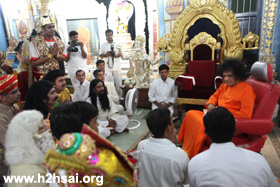 |
Then, He moved into the Bhajan Hall where all the actors in their costumes sat awaiting His blessings to begin the drama. Swami entered from the front door and right away began to enquire into the different characters present. One enterprising actor came forward and "introduced" to Swami some of the characters - Gangadhar Tilak, Alexander the great, Aurobindo, Lord Rama.
When 'Lord Rama' arrived in the front, Swami asked, "Where is Lakshmana?" It was like Rama and Lakshmana were inseparable and sure enough, Lakshmana arrived. Swami called one of the teachers and asked, "What (role) are you doing?" He said that he was coordinating! Swami then blessed the troupe and told them to move out and begin the presentation.
Swami arrived on the dais and a long line of students moved from the Bhajan Hall to the backstage area. When Swami asked for the programme to begin, Sri Aurobindo, Tilak and Alexander arrived on stage and offered the programme and a rose at His lotus feet.
 |
 |
The drama began in the period when Bengal was being partitioned based on religious differences and mobs of Hindus and Muslims gathered to fight out their respective cases. As the fight got hotter, Swami looked and said, "They are fighting among themselves!"
Soon, wisdom prevails when Bal Gangadhar Tilak, Aurobindo and Tagore infuse peace, calm and unity among all. But Aurobindo is worried about this "greatest attack" on Bharatiya culture. He recalls the story of Alexander and Porus wherein the great conqueror realized the Truth of life that how much ever a man conquers, he will one day leave empty handed. "Seek not a place in the bowels of earth but in the hearts of men and God" seemed to be the message if we are allowed the liberty to play with Gibran's quote.
 |
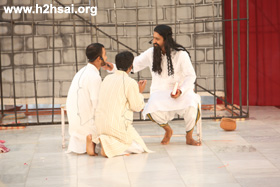 |
The student acting as Alexander had a huge frame and so Swami asked, "Will the chair be able to bear him? Will it not break?" A smile blossomed on His sweet face and it spread to all nearby who heard and understood Him.
The drama meanwhile moved on to the jail where Aurobindo was held prisoner for masterminding the Alipore bomb blast case. That is where he receives the ultimate spiritual experience of getting lost in Krishna consciousness. He begins to see everything as Krishna and is convinced that his duty lies in planning for India after Independence.
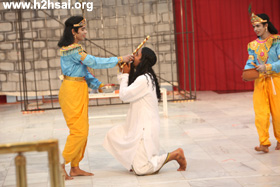 |
 |
A moving song filled the air and the hearts of everyone gathered too. When Krishna arrived thus on the stage, Swami was moved. He must have got nostalgic, for age after age that is what He has been doing - uplifting His devotees.
The next scene shifts to the court where a young advocate, Chittaranjan Das (who later came to be called "Deshabandhu" or "friend of the country") is divinely inspired to fight out the case for Aurobindo and finally wins it for him too.
 |
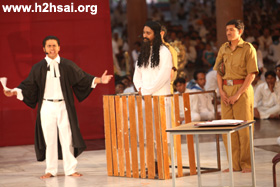 |
At that point Swami asked, "What is that protruding from his ear?" "Mike Swami!" was the answer! It was such a cute question and the answer brought another smile on the Divine face. It must be mentioned here that the dialogues were all delivered live and so was the background music and singing! It was a magnificent effort and the spirit was marvellous.
 |
The powerful message of Lord Rama that the mother and Motherland are greater than the highest heavens was impressed upon all. The lesson that a true Bharatiya is one who has Love (Rathi) for God was also communicated emphatically.
The drama concluded with the episode wherein Sri Aurobindo came out of his vow of silence on the 24th of November, 1926, to declare that Krishna had descended on earth!
The drama on the whole was powerful but its force was reduced with the unusually long gaps between the scenes. Swami's presence on the stage however was the big plus factor and as the saying goes, "Alls well that ends well!" Swami blessed the actors of the drama as they came into the final formation.
He asked for aarthi and accepted the rose from the designated elder as well the student. As He was about to leave, "Aurobindo" stepped up and requested Swami for a group photograph for which Swami graciously consented.
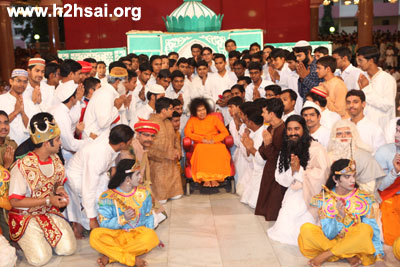 |
Posing with His students, Swami gave separate photos for the actors, the background maintenance boys and the singers too. Moving up the stage, Swami blessed everyone again and retired for the day.
Dear reader, how do you like this section? Does it help or inspire you in anyway? Please share your reflections with us by writing to h2h@radiosai.org mentioning your name and country.
Thank you for your time.





